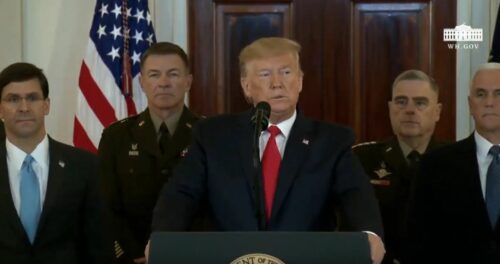 Speaking to the nation from the White House this morning, President Trump made his first public comments regarding recent tensions with Iran. Flanked by VP Pence, administration and military officials, Trump said that Tuesday night’s Iranian missile strike on the al-Asad airbase in Iraq did not harm any US or Iraqi troops and that Iran now appears to be standing down.
Speaking to the nation from the White House this morning, President Trump made his first public comments regarding recent tensions with Iran. Flanked by VP Pence, administration and military officials, Trump said that Tuesday night’s Iranian missile strike on the al-Asad airbase in Iraq did not harm any US or Iraqi troops and that Iran now appears to be standing down.
President Trump indicated that he would not seek further escalation with Iran over the regime’s response to the assassination of their top general, Qassem Soleimani. He also stressed that he would never allow Iran to become a nuclear power, which he says would destabilize the region and the world. He also warned Iranian leaders against continuing to be involved with terrorist activities and other destabilizing actions Iran engages in across the region. He threatened to impose further crippling sanctions on Iran if they did not heed his warnings, but extended his had in peace, telling the world that “The United States is ready to embrace peace with all who seek it.”
President Trump also called on NATO to take on a bigger role in keeping the Middle East stable, and urged nations that still abide by the 2015 nuclear deal with Iran to abandon it.
Iran’s Foreign Minister, Javad Zarif, indicated on Twitter that they were not going to seek future escalation if the US declined to respond to their missile attack. In a Tuesday night Twitter post, Zarif wrote that Iran had “concluded proportionate measures” in response to the assassination of Soleimani, a revered figure in Iran and equally hated and feared across the region. The fact that no US soldiers were harmed in the attack gave President Trump an opening to deescalate the situation, which he appears to be doing.
Even so, it is possible, even likely, that Iran will continue to take actions in retribution for the killing of Soleimani through their numerous proxies throughout the Middle East.
